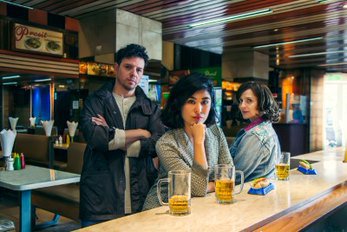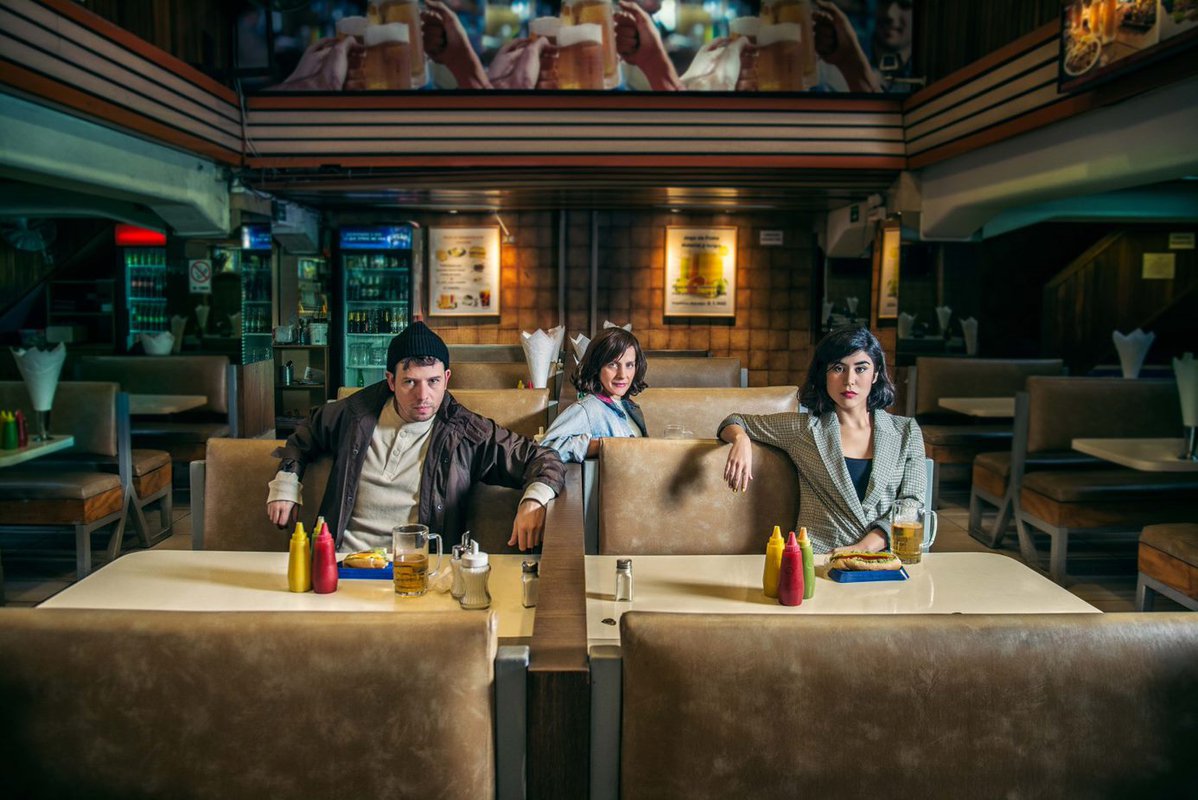Teatro
Written and directed by: Guillermo Calderón | Cast: Luis Cerda, Camila González and Francisca Lewin | Assistant director: Ximena Sánchez | Set, costume and lighting designer: Rocío Hernández | Wardrobe and assistant designer: Daniela Vargas | Audiovisual development: Alex Waghorn, La Copia Feliz and Ximena Sánchez | Producer: María Paz González | Coproduced by: the Teatro a Mil Foundation, UC Theater and Theater der Welt.
Guillermo Calderón
Playwright and director
Theater as resistance
A playwright, scriptwriter and theater director (Santiago, 1971), Calderón is one of the most international figures in contemporary Chilean theater. In 2006, he cofounded the Teatro en el blanco company, writing and directing Neva and Diciembre. Then came works such as Clase, Villa, Discurso, Escuela, Kuss, Beben and Mateluna. He directed Beben and Kuss at the Dusseldorf Schauspielhaus; Goldrausch at the Basel Theater and Neva at New York’s Public Theater. In 2017, the Royal Court Theater in London produced his piece, B. His work has been presented in more than 25 countries. In film, he has worked on the scripts of Violeta se fue a los cielos and Araña, de Andrés Wood, as well as El club, Neruda and Ema by Pablo Larraín.
“A well-executed production that, with a healthy dose of nostalgia, goes through different categories of art and the need for plays whose endings are something other than superfluous”.
“Dragón clearly exhibits (Calderon’s) skill at managing the resources at his disposal so as to include greatness in everyday life”.
—Biobío Radio
—Walter Rodney (1942-1980): Dragón makes several references to this intellectual, born in Guyana in 1942. As an anticolonial historian, capitalist system critic and one of the most important figures in the Black Power movement in the Caribbean, his academic interests were as important as his commitment to exploited groups and the Caribbean community of African descendance. To him, these were the two great powers that could lead a revolution and change the system. He was murdered in an attack in 1980, after several year’s persecution for being a possible subversive.
—Invisible theater: This is another of the forms of representation referred to in the play. It occupies open spaces - the street, a mall - to recreate a fictional story in a real context. In other words, those who see it don’t know that the people in it are actors. This concept is attributed to Brazilian playwright and theater director, Augusto Boal (1931-2009), who also created the ‘Theater of the Oppressed’ concept.
—Performance: an avant-garde art form in which the play’s medium is the artist’s body and the play itself is made up of the actions this carries out, normally combined with multiple other elements such as the visual arts, music, dance and theater. It’s one of the art forms that transformed art in the middle of the twentieth century.
—Installation: a contemporary art genre that prioritizes ideas more than formalities; in other words, the piece’s set and form are at the service of the specific concept the artist wants to explore. Objects are used, spaces intervened with and elements organized according to an infinite selection of physical, visual or sound-related mediums, like photography, videos or performance, in order to make the audience reflect on or feel certain things.
—Guillermo Calderón and Carla Zúñiga talk about their plays performed as part of Teatro Hoy 2019 on Teatroamil.tv



Dragón
Written and directed by Guillermo Calderón
- Chile
- Spanish
- 90 minutes
- + 12 years
Can art be a conduit for social change? Guillermo Calderón’s new production explores – both ironically and critically - artists’ involvement in dealing with current and important issues.
The Dragón group gets together every now and then at a restaurant on the Plaza Italia to decide upon and plan their next artistic installation. This time though, they’ve chosen an issue so complex that they’re locked in a bitter dispute that’s destroying them. The only way to restore the trust between them is to put on a new play, but it’s too late. Their only way to create is based on betrayal.
Chilean director and playwright Guillermo Calderón’s most recent production after Mateluna (2016) is a reflection on art’s political role and the problems that emerge when you have to decide how to represent complex, relevant and important issues in a play. What role does - or should - art play? This is one of the important questions that Dragón poses, as well as its critique of Chilean and Latin American society. The play is a UC Theater, Teatro a Mil Foundation and Theater der Welt 2020 Düsseldorf coproduction and was premiered as part of the ninth Teatro Hoy season.

Written and directed by: Guillermo Calderón | Cast: Luis Cerda, Camila González and Francisca Lewin | Assistant director: Ximena Sánchez | Set, costume and lighting designer: Rocío Hernández | Wardrobe and assistant designer: Daniela Vargas | Audiovisual development: Alex Waghorn, La Copia Feliz and Ximena Sánchez | Producer: María Paz González | Coproduced by: the Teatro a Mil Foundation, UC Theater and Theater der Welt.
Guillermo Calderón
Playwright and director
Theater as resistance
A playwright, scriptwriter and theater director (Santiago, 1971), Calderón is one of the most international figures in contemporary Chilean theater. In 2006, he cofounded the Teatro en el blanco company, writing and directing Neva and Diciembre. Then came works such as Clase, Villa, Discurso, Escuela, Kuss, Beben and Mateluna. He directed Beben and Kuss at the Dusseldorf Schauspielhaus; Goldrausch at the Basel Theater and Neva at New York’s Public Theater. In 2017, the Royal Court Theater in London produced his piece, B. His work has been presented in more than 25 countries. In film, he has worked on the scripts of Violeta se fue a los cielos and Araña, de Andrés Wood, as well as El club, Neruda and Ema by Pablo Larraín.
«Un montaje muy bien logrado, que, no sin nostalgia, revisa categorías en torno al arte respecto de las necesidades de obras cuyo compromiso sea más que ornamental».
«Dragón exhibe con mayor claridad el alto nivel (de Calderón) en el manejo de los recursos que utiliza para insertarse en la grandeza de lo cotidiano».
—Walter Rodney (1942-1980): en Dragón hay varias referencias a este intelectual nacido en Guyana en 1942. Como historiador anticolonialista, crítico del sistema capitalista y uno de los exponentes más importantes del movimiento Black Power en el Caribe, sus preocupaciones académicas fueron tan fuertes como su compromiso social con los grupos explotados y la comunidad afrodescendiente del Caribe; para él, esas eran las dos grandes fuerzas que podrían llevar a cabo una revolución que cambiara el sistema. Fue asesinado en 1980 en un atentado, después de varios años siendo perseguido como un potencial “agente de subversión”.
—Teatro invisible: otra de las alusiones que hace la obra es a esta forma de representación, que ocupa espacios abiertos —la calle, un centro comercial— para recrear una historia ficcionada en un contexto real; es decir, quienes son testigos de ella no saben que sus protagonistas son actores. Se le atribuye este concepto al dramaturgo y director de teatro brasileño Augusto Boal (1931-2009), creador del concepto “Teatro del oprimido”.
—Performance: expresión artística de carácter vanguardista en la que el medio de la obra es el cuerpo del artista y la obra en sí es la acción que éste realiza, combinando, en general, múltiples elementos, como las artes plásticas, la música, la danza y el teatro. Es una de las expresiones artísticas que transformaron el arte a mediados del siglo XX.
—Instalación: género del arte contemporáneo en el que se privilegia una idea por sobre los aspectos formales; es decir, el montaje y la forma de la obra están al servicio de un concepto particular que el artista desea explorar. Para ello se utilizan objetos, se intervienen espacios y se ordenan elementos —que pueden ser una infinidad de medios físicos, visuales o sonoros, como la fotografía, el video o la performance— para generar ciertas reflexiones o sentimientos en el espectador.
—Guillermo Calderón y Carla Zúñiga hablan de sus obras participantes en Teatro Hoy 2019 en Teatroamil.tv
PRODUCE





